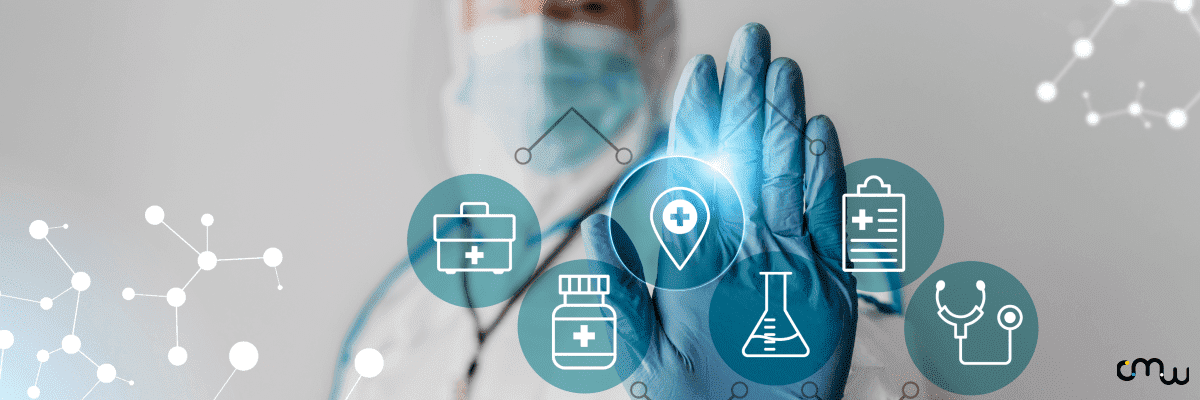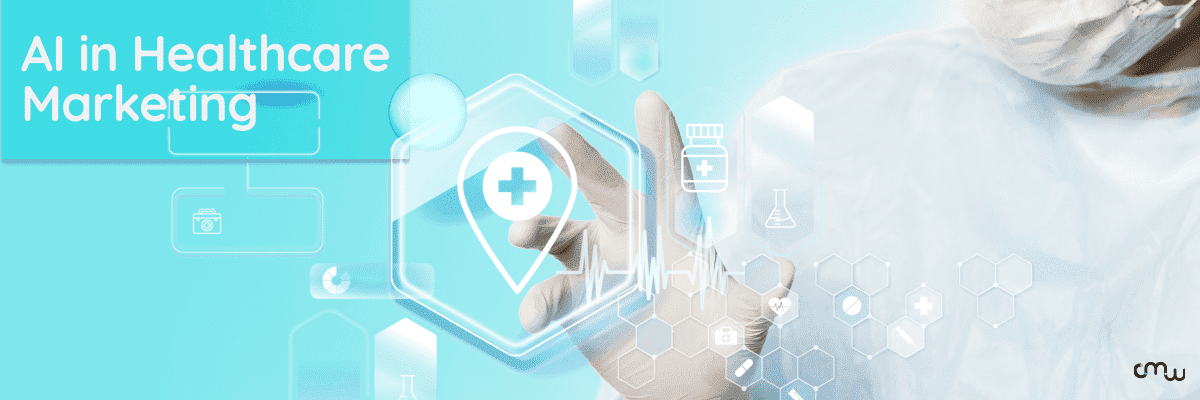Artificial intelligence (AI) is rapidly transforming the healthcare industry by providing a new level of insight and efficiency. AI technologies are being increasingly utilized in various aspects of healthcare, including marketing. AI has the potential to revolutionize healthcare marketing by providing advanced analytical capabilities, personalized content, and real-time data analysis. In this article, we will discuss the benefits of AI in healthcare marketing and how it can be used to maximize the potential of marketing strategies.
The Role of AI in Healthcare Marketing
Artificial Intelligence (AI) has revolutionized many industries, and healthcare marketing is no exception. AI is increasingly being used to analyze large volumes of data and assist healthcare marketers in making data-driven decisions. This has the potential to lead to more effective and efficient marketing strategies. In addition, AI can help improve the targeting and personalization of marketing messages, allowing healthcare marketers to reach patients with the right message at the right time and in the right way. Furthermore, AI can be used to improve patient outcomes by providing targeted messaging and education that promotes healthy behaviors and adherence to treatment plans. In this article, we will explore the role of AI in healthcare marketing and the benefits it offers.
AI and Patient Data
The use of patient data in healthcare marketing is critical to the success of targeted messaging and personalized campaigns. AI plays a crucial role in analyzing patient data to identify trends, preferences, and behaviors that can inform marketing decisions. With AI, healthcare marketers can create targeted campaigns tailored to specific patient populations, resulting in increased engagement, improved health outcomes, and reduced costs.
AI-powered analytics can provide healthcare marketers with insights into patient behaviors, including how patients search for and consume health information, what channels they use to access this information, and what types of content resonate with them the most. This information can be used to develop targeted marketing messages that are personalized and relevant to each patient's needs.
Overall, the role of AI in healthcare marketing is to use patient data to create targeted and personalized campaigns that improve patient outcomes and reduce costs. While the use of patient data must be approached ethically and with the utmost care, AI can provide invaluable insights that can inform healthcare marketing decisions and ultimately lead to improved patient engagement and outcomes.
AI and Customer Experience
AI can revolutionize customer experience in healthcare marketing. By leveraging machine learning and natural language processing, AI can understand individual patients' and customers' unique preferences, needs, and behavior patterns. This information can then be used to create personalized marketing campaigns and tailored experiences that improve satisfaction and engagement.
One of the most significant benefits of AI in customer experience is its ability to improve access to information and support. AI-powered chatbots and virtual assistants can provide patients with instant access to relevant information and resources, such as appointment scheduling, medication reminders, and wellness tips. These tools can also answer common questions and triage patient concerns, freeing up staff time and improving patient satisfaction.
Real-world examples of AI-powered customer experience initiatives in healthcare marketing include the use of virtual nurses and assistants to triage patient concerns and provide personalized support. For example, the Mayo Clinic's AI-powered virtual nurse, called "Mayo," uses natural language processing and machine learning to interact with patients, answer common questions, and provide guidance on treatment options. Similarly, the Cleveland Clinic has developed an AI-powered chatbot called "Concierge" that assists patients with scheduling appointments and answering questions.
Overall, AI has the potential to improve customer experience in healthcare marketing significantly. Healthcare marketers can leverage patient data and advanced analytics to create more personalized and relevant messaging that improves engagement and satisfaction. However, ethical considerations must be taken into account to ensure that patient data is used appropriately and that customers are treated fairly and transparently.
AI and Content Creation
AI can revolutionize how healthcare marketers create content for their campaigns. One key advantage of using AI is the ability to generate targeted and personalized content that resonates with individual customers. AI algorithms can analyze vast amounts of data on customer preferences, behaviors, and demographics to create customized content that is more likely to engage and convert potential customers.
AI-powered content creation can also save marketers time and resources by automating the creation of certain types of content, such as social media posts and blog articles. This can free up marketers to focus on more strategic tasks, such as campaign planning and analysis.
However, using AI for content creation in healthcare marketing also has challenges and limitations. One major challenge is ensuring that the content generated by AI algorithms is accurate and appropriate. This is particularly important in the healthcare industry, where inaccurate or misleading information can have severe consequences for patients.
Another limitation is the potential for AI-generated content to lack creativity or emotional resonance. While AI can excel at creating data-driven content, it may struggle to create content that effectively communicates emotions or tells a compelling story. Marketers will need to find ways to balance the efficiency and effectiveness of AI-generated content with the need for creativity and emotional resonance in their campaigns.

AI and Social Media Marketing
AI is revolutionizing the healthcare industry by offering numerous opportunities to improve patient outcomes and drive business growth. One area where AI is proving particularly beneficial is social media marketing. Social media has become an increasingly important channel for healthcare marketers to reach patients, communicate with them, and influence their behavior. However, the sheer volume of data generated by social media can be overwhelming, making it challenging for marketers to identify and reach their target audience effectively.
This is where AI comes in. With its ability to analyze vast amounts of data quickly and accurately, AI can help healthcare marketers gain valuable insights into patient behavior and preferences on social media. By leveraging this information, marketers can create more targeted and personalized social media campaigns that resonate with patients and improve engagement.
In addition to providing valuable insights, AI can also automate many aspects of social media marketing, including content creation, scheduling, and posting. By automating these tasks, healthcare marketers can save time and resources while ensuring that their social media campaigns are consistent, on-brand, and effective.
Overall, the use of AI in social media marketing has the potential to significantly improve patient outcomes and drive business growth for healthcare organizations. By leveraging the power of AI, marketers can gain a deeper understanding of patient behavior and preferences, create more targeted and personalized campaigns, and automate many of the tasks involved in social media marketing.
The Future of AI in Healthcare Marketing
As artificial intelligence (AI) continues to grow in popularity and sophistication, its potential to transform healthcare marketing is becoming increasingly apparent. AI is already being used to analyze patient data, personalize customer experiences, and create targeted marketing campaigns. Looking to the future, there are several trends that are likely to shape the role of AI in healthcare marketing.
One of the most promising areas for AI in healthcare marketing is voice search. With the increasing use of voice assistants like Siri and Alexa, many patients are turning to voice search to find healthcare information and services. AI-powered voice search can be used to create more accurate and relevant search results, helping patients find the information and services they need more quickly and easily.
Another area where AI is likely to play a significant role in the future of healthcare marketing is chatbots. Some healthcare organizations are already using chatbots to provide patients with personalized information and assistance, and this trend is likely to continue. AI-powered chatbots can provide patients with a more engaging and interactive experience while also helping healthcare organizations streamline their operations and reduce costs.
However, as with any new technology, there are also potential challenges and limitations to consider. One of the biggest challenges is the need to ensure that AI-powered healthcare marketing initiatives are ethical and transparent. Healthcare organizations must be transparent about how they are collecting and using patient data and ensure that patients have control over their own data.
Another potential challenge is the need for specialized expertise and training. Healthcare organizations will need to invest in the training and development of AI experts who can help to implement and manage AI-powered marketing initiatives. Additionally, there may be regulatory and legal challenges to overcome, as healthcare marketing using AI is still a relatively new field.
Despite these challenges, the potential benefits of AI in healthcare marketing are significant. AI has the potential to improve patient outcomes, reduce costs, and enhance the overall patient experience. As healthcare organizations continue to invest in AI-powered marketing initiatives, we can expect to see significant growth and innovation in this area in the years to come.
Ethical Considerations in AI-Powered Healthcare Marketing
The increasing use of artificial intelligence (AI) in healthcare marketing has raised a number of ethical considerations that must be addressed. One key consideration is data privacy. As AI-powered marketing relies heavily on patient data, it is essential for healthcare organizations to ensure that patient data is protected and used in a responsible manner. This includes obtaining patient consent for the use of their data and ensuring that data is stored securely.
Another important ethical consideration is bias. AI algorithms may reflect the biases of their creators or the data sets on which they are trained, which can lead to unfair or inaccurate marketing. Healthcare organizations must take steps to minimize bias in their AI algorithms, such as ensuring diverse representation in data sets and regularly auditing their algorithms for bias.
Transparency is also an essential ethical consideration in AI-powered healthcare marketing. Patients have the right to know how their data is used and how AI is used to create marketing messages. Healthcare organizations must be transparent about their use of AI in marketing and ensure that patients are fully informed about their data privacy rights.
Overall, it is essential for healthcare organizations to prioritize ethical considerations in using AI-powered marketing to ensure that they are using these technologies responsibly and effectively.
AI Implementation in Healthcare Marketing
Implementing AI in healthcare marketing can be challenging and requires careful planning and consideration. One major challenge is the need for a large amount of quality data to train AI algorithms. Healthcare marketers must ensure that their data is accurate, reliable, and unbiased to avoid issues with AI-generated insights and recommendations.
Another consideration is the need for a skilled workforce to manage AI systems and analyze data. Healthcare organizations must invest in training programs and recruit qualified professionals to ensure AI systems' successful implementation and operation.
To successfully implement AI in healthcare marketing, organizations should start with small pilot projects to test the technology and gather insights. As AI systems become more integrated into marketing operations, it is essential to establish clear guidelines and standards for ethical and responsible use.
Overall, the successful implementation of AI in healthcare marketing requires a thoughtful and strategic approach that takes into account the unique challenges and opportunities presented by this rapidly-evolving technology.
In conclusion, AI has the potential to revolutionize healthcare marketing by enabling more personalized and targeted campaigns that can improve patient outcomes. However, ethical considerations and practical implementation strategies must be carefully considered. As the healthcare industry evolves, healthcare marketing agencies like
can leverage AI to create more effective and efficient marketing campaigns that benefit patients and healthcare organizations. With a focus on ethical considerations and successful implementation, the future of AI-powered healthcare marketing looks bright.
















